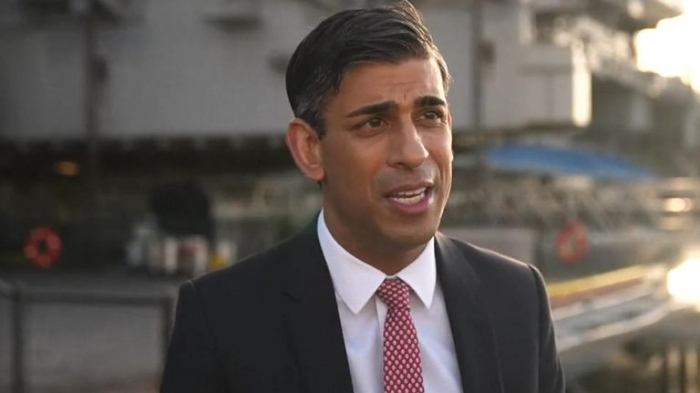China "represents a challenge to the world order" which the UK must take seriously, Rishi Sunak has said.
The prime minister told the BBC he was increasing funding for the armed forces because "the world has become more volatile" and "threats to our security have increased".
Defence spending will rise by nearly £5bn over the next two years.
But No 10 has given no timeframe for a longer term ambition to boost spending to 2.5% of national income.
Mr Sunak was speaking in California, where he is holding talks with his US and Australian counterparts to agree details of a UK-US pact to supply Australia with nuclear-powered submarines.
The agreement, known as the Aukus pact, was signed in 2021 as part of a joint effort to counter Chinese military power in the Indo-Pacific region.
In an interview with the BBC's Chris Mason, Mr Sunak said: "China is a country with fundamentally different values to ours and it represents a challenge to the world order.
"And that's why it's right that we are alert to that and take steps to protect ourselves… stand up for our values and protect our interests."
He said the government took the "challenge" posed by China seriously, adding that the UK had taken action including blocking Chinese investment in sensitive sectors like semiconductors.
Pressed on whether the ambition to increase defence spending to 2.5% of national income was meaningless without a timeframe, the prime minister said the government should be judged "on our actions".
As chancellor, Mr Sunak said he had overseen the largest uplift in defence spending since the end of the Cold War and the government had increased spending every year since then.
"We're one of the largest spenders on defence anywhere in the world, the largest in Europe, and that will continue to remain the case," he added.
However, Labour pointed out that defence spending had not hit 2.5% of GDP since it left government in 2010.
Shadow Foreign secretary David Lammy described the ambition as "another hollow promise", with "no plan and no timetable".
Some Tory MPs have also expressed concern about the level of investment in the armed forces.
Tobias Ellwood, who is chair of the Commons Defence Committee, said the UK was on a "peacetime budget" as the world was "sliding towards a new Cold War".
While Defence Secretary Ben Wallace has publicly welcomed the extra £5bn announced by the prime minister, he had been hoping for considerably more.
There had been reports - denied by Mr Wallace - that he had threatened to resign if he did not get a commitment to increase defence spending to 3% of GDP by 2030.
Mr Wallace told the Commons he was "not interested" in resigning, although he added that he was worried about the increased threats facing the UK and long-term investment was needed.
Hulking floating airports, aircraft carriers, dominate the shoreline on the Pacific Coast of the United States, where there is a gathering of what's known as the Aukus pact: Australia, the United States and the United Kingdom, keeping a collectively nervous eye on an increasingly muscular China.
Privately, the government is stark in its assessments.
Western democracies are comparatively and collectively weaker economically as China grows; Beijing can use every instrument of the state as a tool of foreign policy in a way that's impossible in an open democracy.
All the data make us more concerned, not less, as one senior figure put it. The review of foreign and defence policy, which has just been published, says the UK is committed to "swift and robust action" to counter any threat to UK national interests from China.
And In the next few hours Rishi Sunak will meet his Australian counterpart and President Biden and announce a joint programme to provide Australia with nuclear powered submarines.
More about:
















































